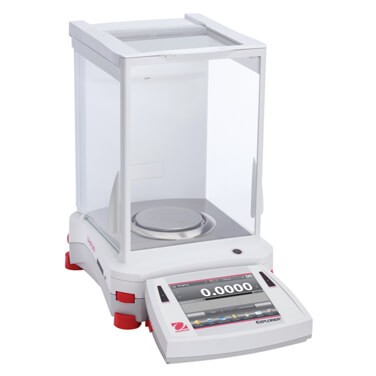OHAUS Explorer Balances: Minimizing Result Uncertainty
"Garbage in, garbage out" applies to every scientific endeavor from computer science to microbiology. It means that the end results can only be as good as the data collected and used to reach them. Several organizations, including the Federal Drug Administration (FDA) and the United States Pharmacopeia (USP), have created standards by which all aspects of data generation are governed. For example, analytical instruments must be periodically calibrated, and the data they produce must be verifiable, traceable, and accurate.
There are few analytical instruments that are more ubiquitous (and potentially overlooked) in the lab than balances. They’re responsible for measuring all sorts of samples and generating critical data. How certain are you that your weighing results are trustworthy? How comfortable would you be having your weighing process and results audited? Ohaus Explorer balances provide many features that help minimize result uncertainty and are available at an economical price.
Weighing Performance
Measurement uncertainty can occur with high-quality instruments. It’s a common mistake to assume that the “readability” of a balance (or the least significant digit that a balance can display) is the same as the “accuracy” of a balance, which is not the case. All measurement devices are subject to measurement uncertainty — the degree to which a measured value and the true value could potentially differ. Many manufacturers offer many balances at many price points, so choosing the right one could be difficult. Ohaus Explorer balances offer exceptional weighing performance and provide results with minimal uncertainty.
Connectivity and Data Integrity
Once generated, quality data must be recorded and archived. A balance can be a stand-alone piece of equipment connected to a printer, but it’s becoming more common for balances to be connected to larger systems: a commercial LIMS, an internal local area network, or simply a single PC. Ohaus Explorer balances provide several connectivity options, including RS-232, USB, and ethernet. Once connected, weighing results can be automatically collected and stored in a digital format (such as an Excel worksheet, a database, and more) with attributes, including a data and time stamp, identification of the balance from which it came, the user who made the measurement, and sample ID. Furthermore, Ohaus' standard communication protocol and response format make collecting and storing data easy.
Automatic Calibration
To minimize result uncertainty, its critical to ensure that results are consistent over time and not affected by changing environmental factors, such as temperature and humidity. Ohaus Explorer balances offer automatic calibration (or AutoCal) that uses an internal calibration mechanism with a motor and one or more weights of known mass that are housed within the balance. AutoCal automatically triggers internal calibration and adjustment when a change of temperature is detected or after a given period of time. This is done without user input when the balance is not in use. AutoCal guarantees that the balance is adjusted to produce accurate results in the current environment and that the balance is always ready for use, eliminating the need for manual calibration and adjustment.
Ohaus Explorer semi-micro, analytical, precision, and high-capacity balances are durably constructed and offer capacities up to 35kg as well as readabilities from 0.01mg to 0.1g. They are well suited for laboratory applications where high accuracy, data integrity, and minimal result uncertainty is paramount.

Content provided by:

